Annotated Bibliography of SMEs and Entrepreneurship
VerifiedAdded on 2020/10/05
|16
|4743
|69
AI Summary
This assignment provides a detailed annotated bibliography of various studies and research papers related to small business management and entrepreneurship. The sources include articles from journals such as the South African Journal of Business Management, Management Research Review, and International Small Business Journal. The bibliography covers topics such as strategic entrepreneurship, soft skills for entrepreneurs, and the impact of Brexit on small businesses. It also includes a selection of relevant books and online resources. The assignment is suitable for students in business or management programs looking to explore these topics further.
Contribute Materials
Your contribution can guide someone’s learning journey. Share your
documents today.

Entrepreneurship and Small
Business Management
Business Management
Secure Best Marks with AI Grader
Need help grading? Try our AI Grader for instant feedback on your assignments.
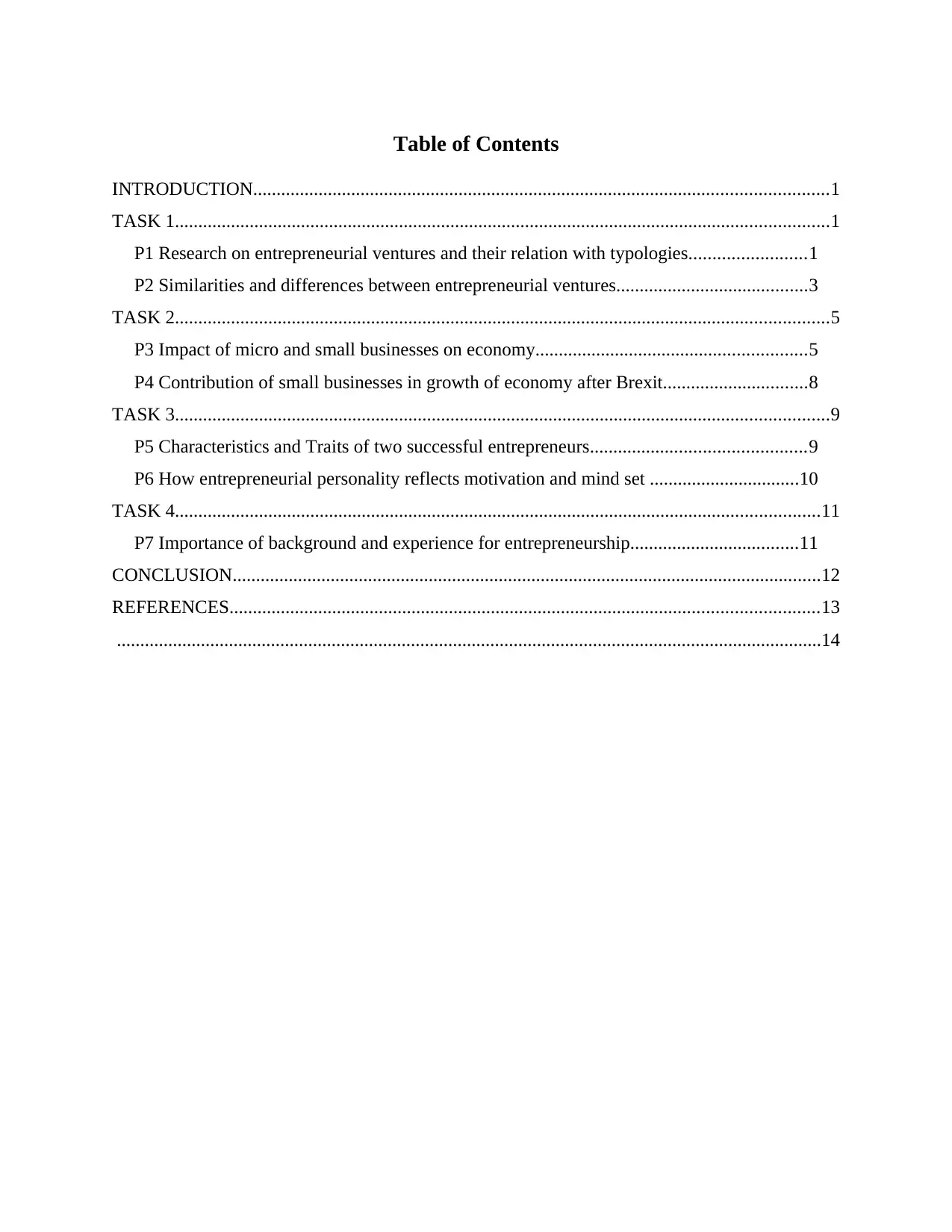
Table of Contents
INTRODUCTION...........................................................................................................................1
TASK 1............................................................................................................................................1
P1 Research on entrepreneurial ventures and their relation with typologies.........................1
P2 Similarities and differences between entrepreneurial ventures.........................................3
TASK 2............................................................................................................................................5
P3 Impact of micro and small businesses on economy..........................................................5
P4 Contribution of small businesses in growth of economy after Brexit...............................8
TASK 3............................................................................................................................................9
P5 Characteristics and Traits of two successful entrepreneurs..............................................9
P6 How entrepreneurial personality reflects motivation and mind set ................................10
TASK 4..........................................................................................................................................11
P7 Importance of background and experience for entrepreneurship....................................11
CONCLUSION..............................................................................................................................12
REFERENCES..............................................................................................................................13
.......................................................................................................................................................14
INTRODUCTION...........................................................................................................................1
TASK 1............................................................................................................................................1
P1 Research on entrepreneurial ventures and their relation with typologies.........................1
P2 Similarities and differences between entrepreneurial ventures.........................................3
TASK 2............................................................................................................................................5
P3 Impact of micro and small businesses on economy..........................................................5
P4 Contribution of small businesses in growth of economy after Brexit...............................8
TASK 3............................................................................................................................................9
P5 Characteristics and Traits of two successful entrepreneurs..............................................9
P6 How entrepreneurial personality reflects motivation and mind set ................................10
TASK 4..........................................................................................................................................11
P7 Importance of background and experience for entrepreneurship....................................11
CONCLUSION..............................................................................................................................12
REFERENCES..............................................................................................................................13
.......................................................................................................................................................14
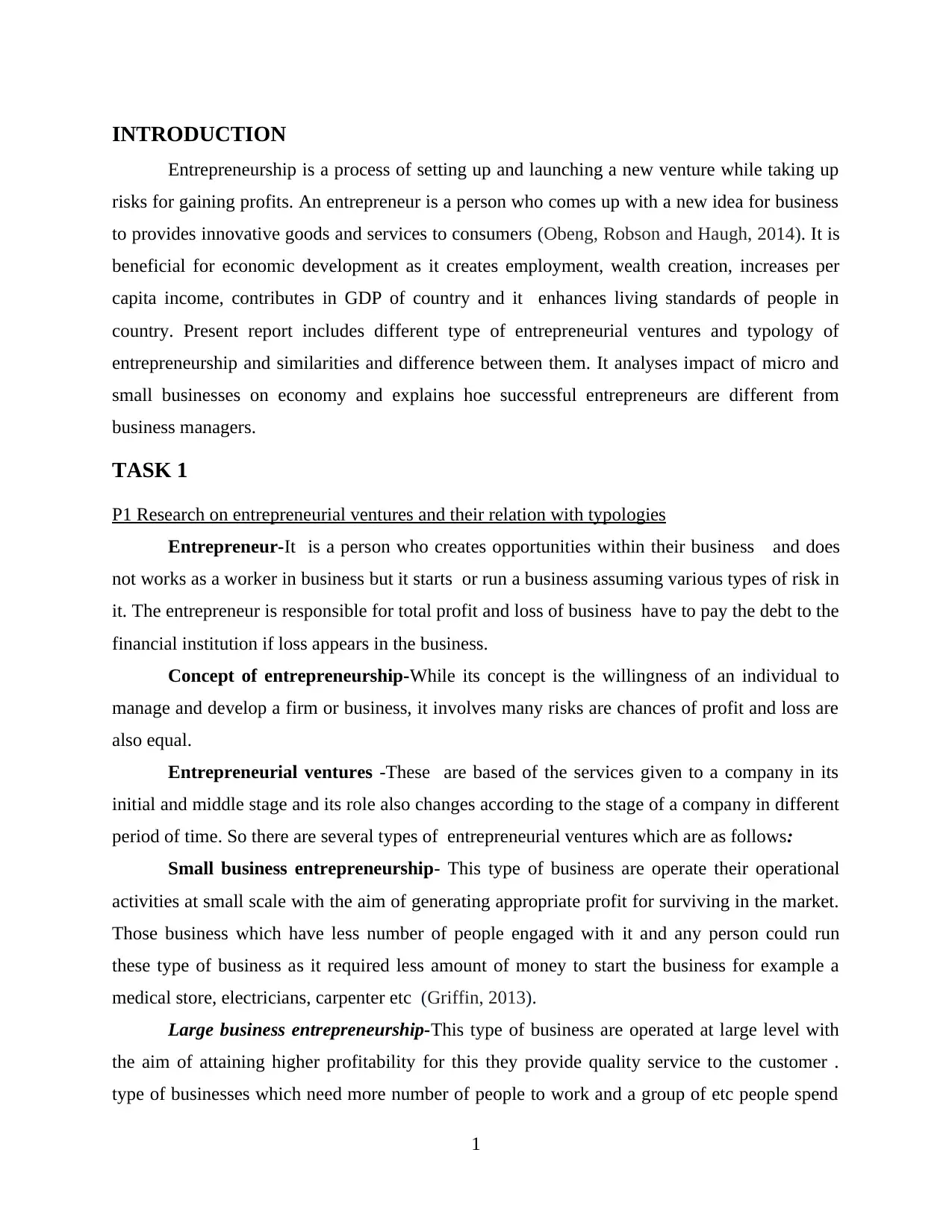
INTRODUCTION
Entrepreneurship is a process of setting up and launching a new venture while taking up
risks for gaining profits. An entrepreneur is a person who comes up with a new idea for business
to provides innovative goods and services to consumers (Obeng, Robson and Haugh, 2014). It is
beneficial for economic development as it creates employment, wealth creation, increases per
capita income, contributes in GDP of country and it enhances living standards of people in
country. Present report includes different type of entrepreneurial ventures and typology of
entrepreneurship and similarities and difference between them. It analyses impact of micro and
small businesses on economy and explains hoe successful entrepreneurs are different from
business managers.
TASK 1
P1 Research on entrepreneurial ventures and their relation with typologies
Entrepreneur-It is a person who creates opportunities within their business and does
not works as a worker in business but it starts or run a business assuming various types of risk in
it. The entrepreneur is responsible for total profit and loss of business have to pay the debt to the
financial institution if loss appears in the business.
Concept of entrepreneurship-While its concept is the willingness of an individual to
manage and develop a firm or business, it involves many risks are chances of profit and loss are
also equal.
Entrepreneurial ventures -These are based of the services given to a company in its
initial and middle stage and its role also changes according to the stage of a company in different
period of time. So there are several types of entrepreneurial ventures which are as follows:
Small business entrepreneurship- This type of business are operate their operational
activities at small scale with the aim of generating appropriate profit for surviving in the market.
Those business which have less number of people engaged with it and any person could run
these type of business as it required less amount of money to start the business for example a
medical store, electricians, carpenter etc (Griffin, 2013).
Large business entrepreneurship-This type of business are operated at large level with
the aim of attaining higher profitability for this they provide quality service to the customer .
type of businesses which need more number of people to work and a group of etc people spend
1
Entrepreneurship is a process of setting up and launching a new venture while taking up
risks for gaining profits. An entrepreneur is a person who comes up with a new idea for business
to provides innovative goods and services to consumers (Obeng, Robson and Haugh, 2014). It is
beneficial for economic development as it creates employment, wealth creation, increases per
capita income, contributes in GDP of country and it enhances living standards of people in
country. Present report includes different type of entrepreneurial ventures and typology of
entrepreneurship and similarities and difference between them. It analyses impact of micro and
small businesses on economy and explains hoe successful entrepreneurs are different from
business managers.
TASK 1
P1 Research on entrepreneurial ventures and their relation with typologies
Entrepreneur-It is a person who creates opportunities within their business and does
not works as a worker in business but it starts or run a business assuming various types of risk in
it. The entrepreneur is responsible for total profit and loss of business have to pay the debt to the
financial institution if loss appears in the business.
Concept of entrepreneurship-While its concept is the willingness of an individual to
manage and develop a firm or business, it involves many risks are chances of profit and loss are
also equal.
Entrepreneurial ventures -These are based of the services given to a company in its
initial and middle stage and its role also changes according to the stage of a company in different
period of time. So there are several types of entrepreneurial ventures which are as follows:
Small business entrepreneurship- This type of business are operate their operational
activities at small scale with the aim of generating appropriate profit for surviving in the market.
Those business which have less number of people engaged with it and any person could run
these type of business as it required less amount of money to start the business for example a
medical store, electricians, carpenter etc (Griffin, 2013).
Large business entrepreneurship-This type of business are operated at large level with
the aim of attaining higher profitability for this they provide quality service to the customer .
type of businesses which need more number of people to work and a group of etc people spend
1
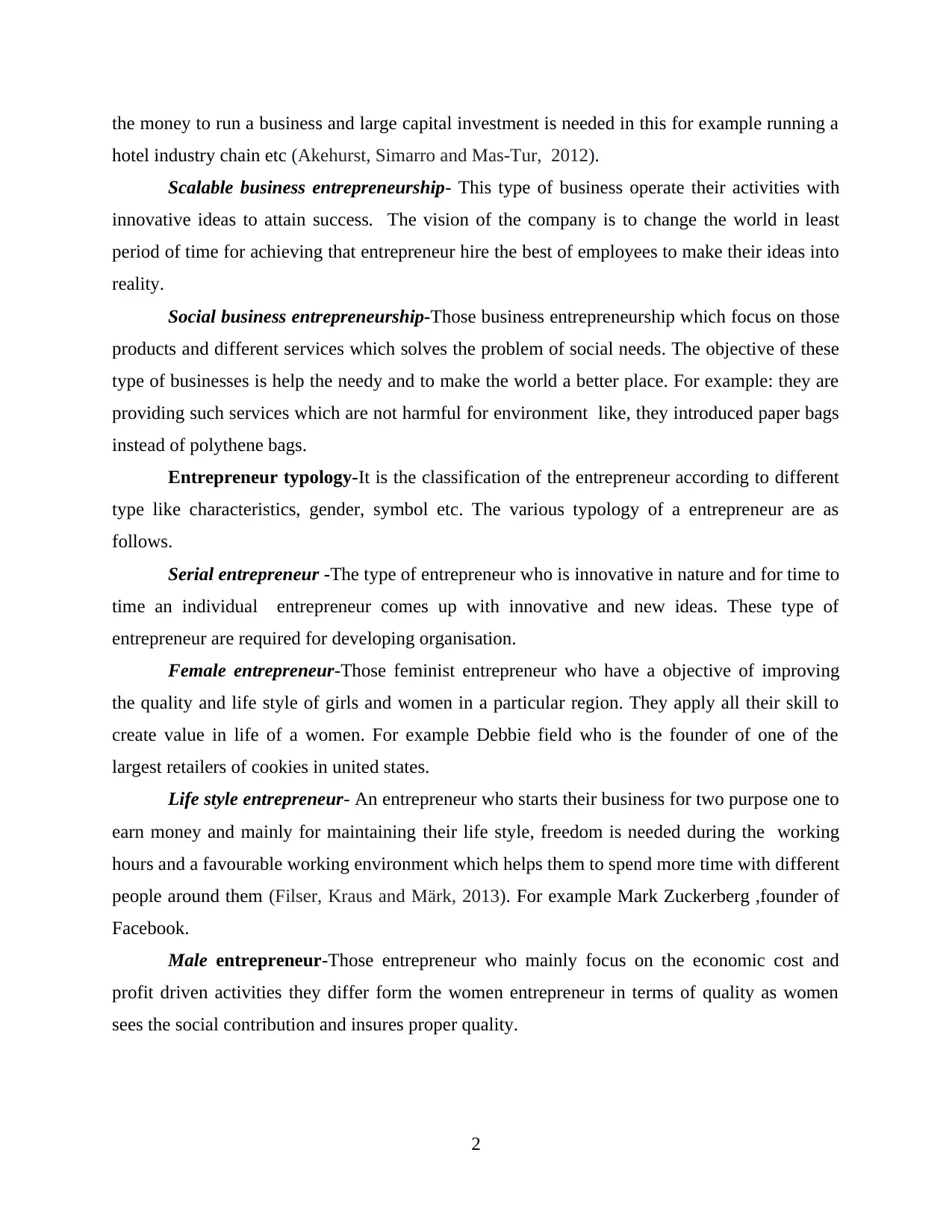
the money to run a business and large capital investment is needed in this for example running a
hotel industry chain etc (Akehurst, Simarro and Mas‐Tur, 2012).
Scalable business entrepreneurship- This type of business operate their activities with
innovative ideas to attain success. The vision of the company is to change the world in least
period of time for achieving that entrepreneur hire the best of employees to make their ideas into
reality.
Social business entrepreneurship-Those business entrepreneurship which focus on those
products and different services which solves the problem of social needs. The objective of these
type of businesses is help the needy and to make the world a better place. For example: they are
providing such services which are not harmful for environment like, they introduced paper bags
instead of polythene bags.
Entrepreneur typology-It is the classification of the entrepreneur according to different
type like characteristics, gender, symbol etc. The various typology of a entrepreneur are as
follows.
Serial entrepreneur -The type of entrepreneur who is innovative in nature and for time to
time an individual entrepreneur comes up with innovative and new ideas. These type of
entrepreneur are required for developing organisation.
Female entrepreneur-Those feminist entrepreneur who have a objective of improving
the quality and life style of girls and women in a particular region. They apply all their skill to
create value in life of a women. For example Debbie field who is the founder of one of the
largest retailers of cookies in united states.
Life style entrepreneur- An entrepreneur who starts their business for two purpose one to
earn money and mainly for maintaining their life style, freedom is needed during the working
hours and a favourable working environment which helps them to spend more time with different
people around them (Filser, Kraus and Märk, 2013). For example Mark Zuckerberg ,founder of
Facebook.
Male entrepreneur-Those entrepreneur who mainly focus on the economic cost and
profit driven activities they differ form the women entrepreneur in terms of quality as women
sees the social contribution and insures proper quality.
2
hotel industry chain etc (Akehurst, Simarro and Mas‐Tur, 2012).
Scalable business entrepreneurship- This type of business operate their activities with
innovative ideas to attain success. The vision of the company is to change the world in least
period of time for achieving that entrepreneur hire the best of employees to make their ideas into
reality.
Social business entrepreneurship-Those business entrepreneurship which focus on those
products and different services which solves the problem of social needs. The objective of these
type of businesses is help the needy and to make the world a better place. For example: they are
providing such services which are not harmful for environment like, they introduced paper bags
instead of polythene bags.
Entrepreneur typology-It is the classification of the entrepreneur according to different
type like characteristics, gender, symbol etc. The various typology of a entrepreneur are as
follows.
Serial entrepreneur -The type of entrepreneur who is innovative in nature and for time to
time an individual entrepreneur comes up with innovative and new ideas. These type of
entrepreneur are required for developing organisation.
Female entrepreneur-Those feminist entrepreneur who have a objective of improving
the quality and life style of girls and women in a particular region. They apply all their skill to
create value in life of a women. For example Debbie field who is the founder of one of the
largest retailers of cookies in united states.
Life style entrepreneur- An entrepreneur who starts their business for two purpose one to
earn money and mainly for maintaining their life style, freedom is needed during the working
hours and a favourable working environment which helps them to spend more time with different
people around them (Filser, Kraus and Märk, 2013). For example Mark Zuckerberg ,founder of
Facebook.
Male entrepreneur-Those entrepreneur who mainly focus on the economic cost and
profit driven activities they differ form the women entrepreneur in terms of quality as women
sees the social contribution and insures proper quality.
2
Secure Best Marks with AI Grader
Need help grading? Try our AI Grader for instant feedback on your assignments.
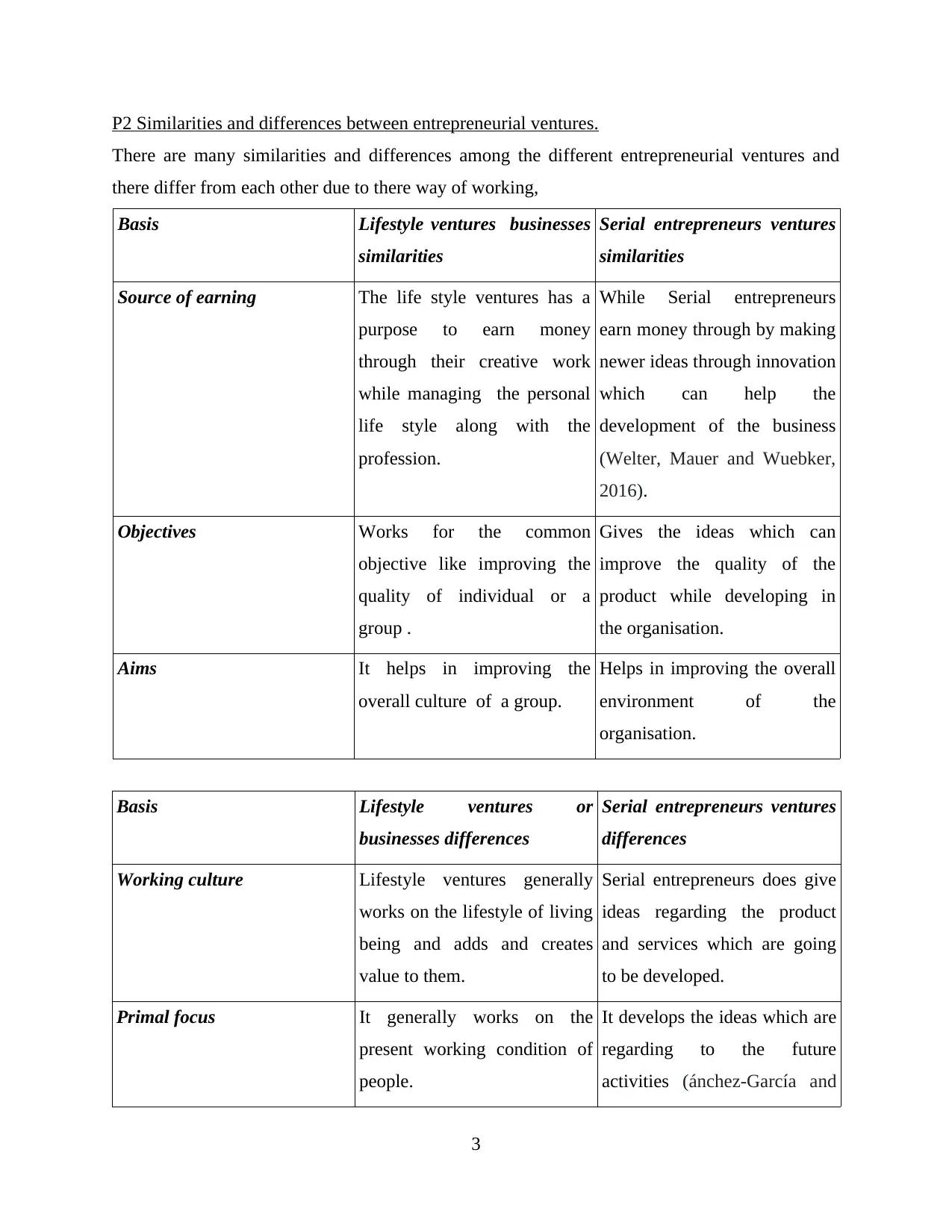
P2 Similarities and differences between entrepreneurial ventures.
There are many similarities and differences among the different entrepreneurial ventures and
there differ from each other due to there way of working,
Basis Lifestyle ventures businesses
similarities
Serial entrepreneurs ventures
similarities
Source of earning The life style ventures has a
purpose to earn money
through their creative work
while managing the personal
life style along with the
profession.
While Serial entrepreneurs
earn money through by making
newer ideas through innovation
which can help the
development of the business
(Welter, Mauer and Wuebker,
2016).
Objectives Works for the common
objective like improving the
quality of individual or a
group .
Gives the ideas which can
improve the quality of the
product while developing in
the organisation.
Aims It helps in improving the
overall culture of a group.
Helps in improving the overall
environment of the
organisation.
Basis Lifestyle ventures or
businesses differences
Serial entrepreneurs ventures
differences
Working culture Lifestyle ventures generally
works on the lifestyle of living
being and adds and creates
value to them.
Serial entrepreneurs does give
ideas regarding the product
and services which are going
to be developed.
Primal focus It generally works on the
present working condition of
people.
It develops the ideas which are
regarding to the future
activities (ánchez-García and
3
There are many similarities and differences among the different entrepreneurial ventures and
there differ from each other due to there way of working,
Basis Lifestyle ventures businesses
similarities
Serial entrepreneurs ventures
similarities
Source of earning The life style ventures has a
purpose to earn money
through their creative work
while managing the personal
life style along with the
profession.
While Serial entrepreneurs
earn money through by making
newer ideas through innovation
which can help the
development of the business
(Welter, Mauer and Wuebker,
2016).
Objectives Works for the common
objective like improving the
quality of individual or a
group .
Gives the ideas which can
improve the quality of the
product while developing in
the organisation.
Aims It helps in improving the
overall culture of a group.
Helps in improving the overall
environment of the
organisation.
Basis Lifestyle ventures or
businesses differences
Serial entrepreneurs ventures
differences
Working culture Lifestyle ventures generally
works on the lifestyle of living
being and adds and creates
value to them.
Serial entrepreneurs does give
ideas regarding the product
and services which are going
to be developed.
Primal focus It generally works on the
present working condition of
people.
It develops the ideas which are
regarding to the future
activities (ánchez-García and
3
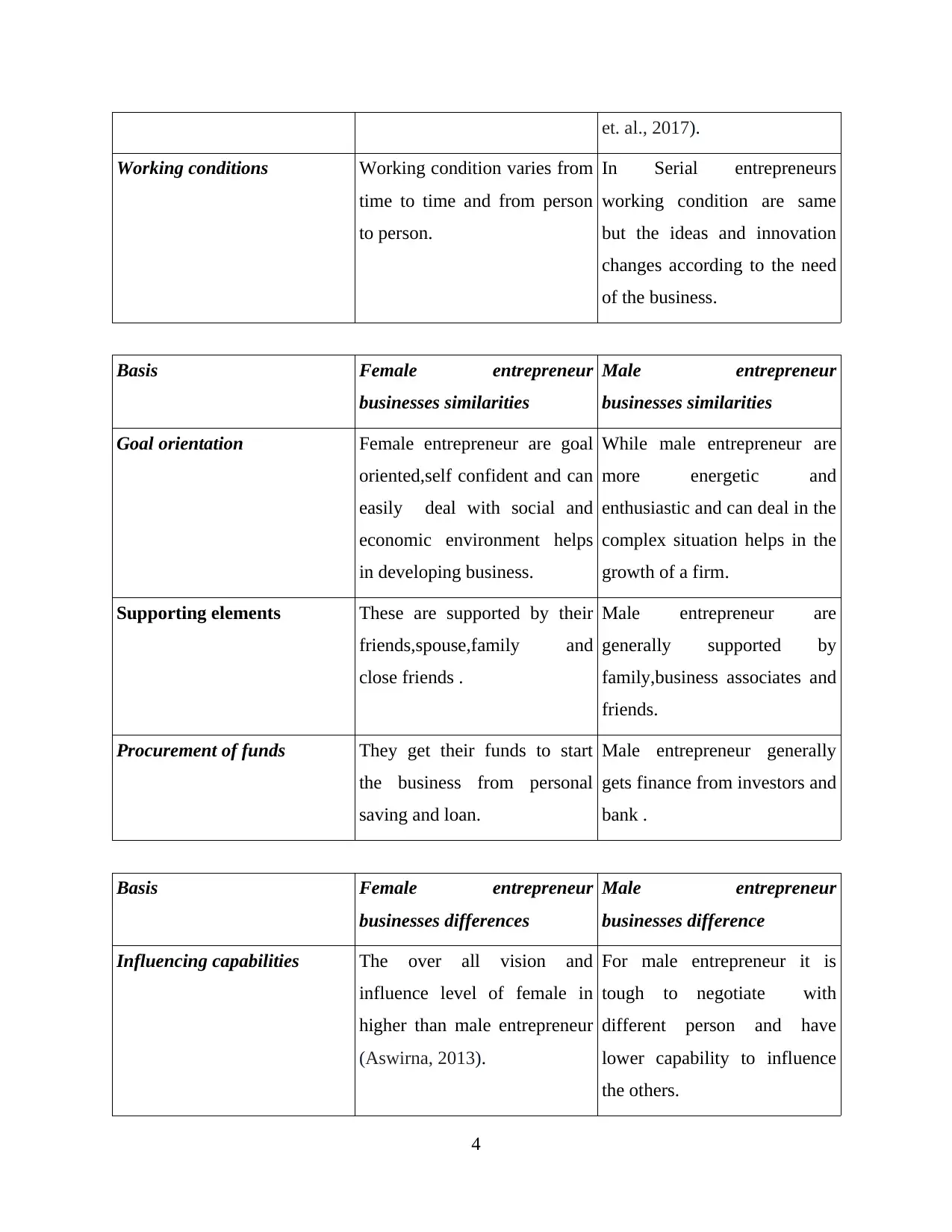
et. al., 2017).
Working conditions Working condition varies from
time to time and from person
to person.
In Serial entrepreneurs
working condition are same
but the ideas and innovation
changes according to the need
of the business.
Basis Female entrepreneur
businesses similarities
Male entrepreneur
businesses similarities
Goal orientation Female entrepreneur are goal
oriented,self confident and can
easily deal with social and
economic environment helps
in developing business.
While male entrepreneur are
more energetic and
enthusiastic and can deal in the
complex situation helps in the
growth of a firm.
Supporting elements These are supported by their
friends,spouse,family and
close friends .
Male entrepreneur are
generally supported by
family,business associates and
friends.
Procurement of funds They get their funds to start
the business from personal
saving and loan.
Male entrepreneur generally
gets finance from investors and
bank .
Basis Female entrepreneur
businesses differences
Male entrepreneur
businesses difference
Influencing capabilities The over all vision and
influence level of female in
higher than male entrepreneur
(Aswirna, 2013).
For male entrepreneur it is
tough to negotiate with
different person and have
lower capability to influence
the others.
4
Working conditions Working condition varies from
time to time and from person
to person.
In Serial entrepreneurs
working condition are same
but the ideas and innovation
changes according to the need
of the business.
Basis Female entrepreneur
businesses similarities
Male entrepreneur
businesses similarities
Goal orientation Female entrepreneur are goal
oriented,self confident and can
easily deal with social and
economic environment helps
in developing business.
While male entrepreneur are
more energetic and
enthusiastic and can deal in the
complex situation helps in the
growth of a firm.
Supporting elements These are supported by their
friends,spouse,family and
close friends .
Male entrepreneur are
generally supported by
family,business associates and
friends.
Procurement of funds They get their funds to start
the business from personal
saving and loan.
Male entrepreneur generally
gets finance from investors and
bank .
Basis Female entrepreneur
businesses differences
Male entrepreneur
businesses difference
Influencing capabilities The over all vision and
influence level of female in
higher than male entrepreneur
(Aswirna, 2013).
For male entrepreneur it is
tough to negotiate with
different person and have
lower capability to influence
the others.
4
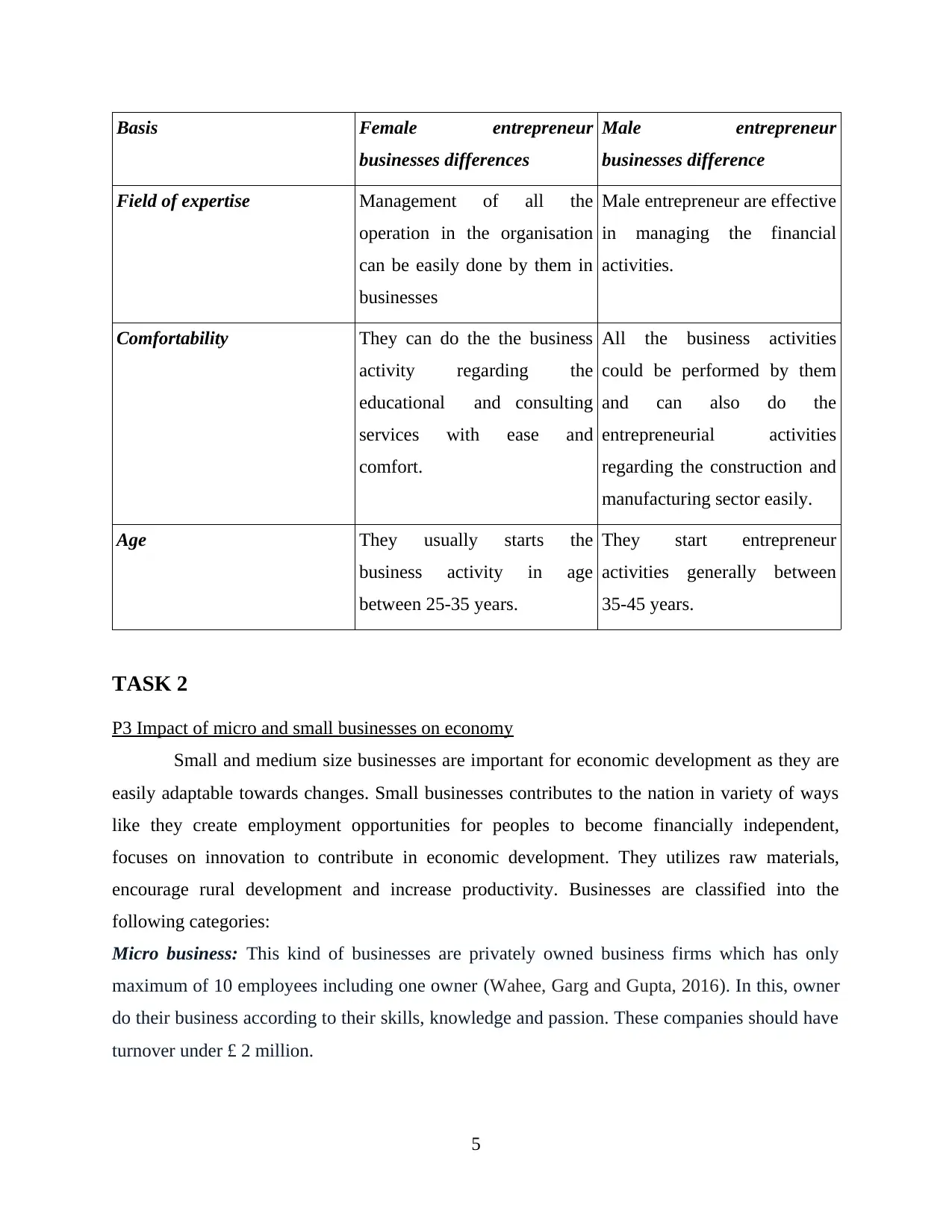
Basis Female entrepreneur
businesses differences
Male entrepreneur
businesses difference
Field of expertise Management of all the
operation in the organisation
can be easily done by them in
businesses
Male entrepreneur are effective
in managing the financial
activities.
Comfortability They can do the the business
activity regarding the
educational and consulting
services with ease and
comfort.
All the business activities
could be performed by them
and can also do the
entrepreneurial activities
regarding the construction and
manufacturing sector easily.
Age They usually starts the
business activity in age
between 25-35 years.
They start entrepreneur
activities generally between
35-45 years.
TASK 2
P3 Impact of micro and small businesses on economy
Small and medium size businesses are important for economic development as they are
easily adaptable towards changes. Small businesses contributes to the nation in variety of ways
like they create employment opportunities for peoples to become financially independent,
focuses on innovation to contribute in economic development. They utilizes raw materials,
encourage rural development and increase productivity. Businesses are classified into the
following categories:
Micro business: This kind of businesses are privately owned business firms which has only
maximum of 10 employees including one owner (Wahee, Garg and Gupta, 2016). In this, owner
do their business according to their skills, knowledge and passion. These companies should have
turnover under £ 2 million.
5
businesses differences
Male entrepreneur
businesses difference
Field of expertise Management of all the
operation in the organisation
can be easily done by them in
businesses
Male entrepreneur are effective
in managing the financial
activities.
Comfortability They can do the the business
activity regarding the
educational and consulting
services with ease and
comfort.
All the business activities
could be performed by them
and can also do the
entrepreneurial activities
regarding the construction and
manufacturing sector easily.
Age They usually starts the
business activity in age
between 25-35 years.
They start entrepreneur
activities generally between
35-45 years.
TASK 2
P3 Impact of micro and small businesses on economy
Small and medium size businesses are important for economic development as they are
easily adaptable towards changes. Small businesses contributes to the nation in variety of ways
like they create employment opportunities for peoples to become financially independent,
focuses on innovation to contribute in economic development. They utilizes raw materials,
encourage rural development and increase productivity. Businesses are classified into the
following categories:
Micro business: This kind of businesses are privately owned business firms which has only
maximum of 10 employees including one owner (Wahee, Garg and Gupta, 2016). In this, owner
do their business according to their skills, knowledge and passion. These companies should have
turnover under £ 2 million.
5
Paraphrase This Document
Need a fresh take? Get an instant paraphrase of this document with our AI Paraphraser
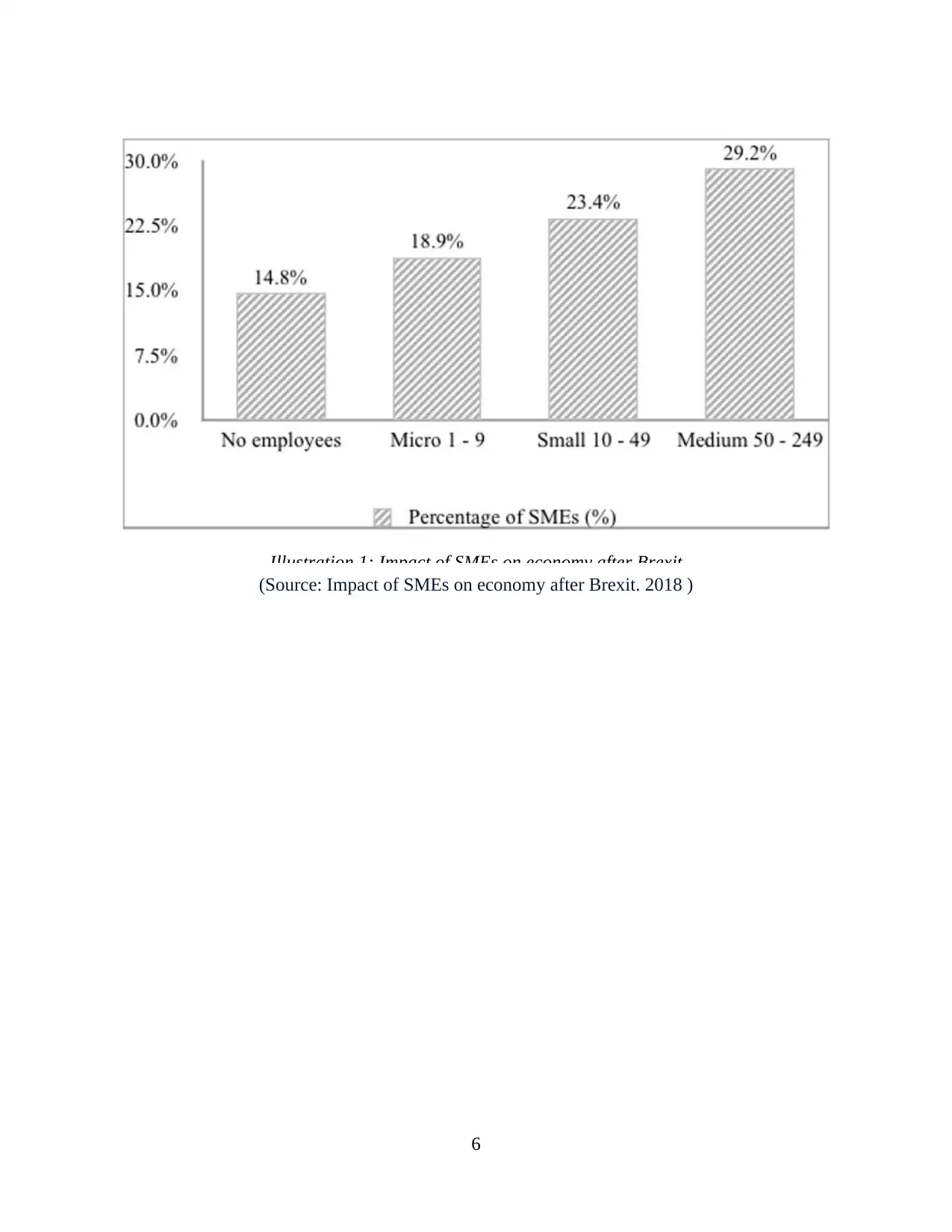
(Source: Impact of SMEs on economy after Brexit. 2018 )
6
Illustration 1: Impact of SMEs on economy after Brexit
6
Illustration 1: Impact of SMEs on economy after Brexit
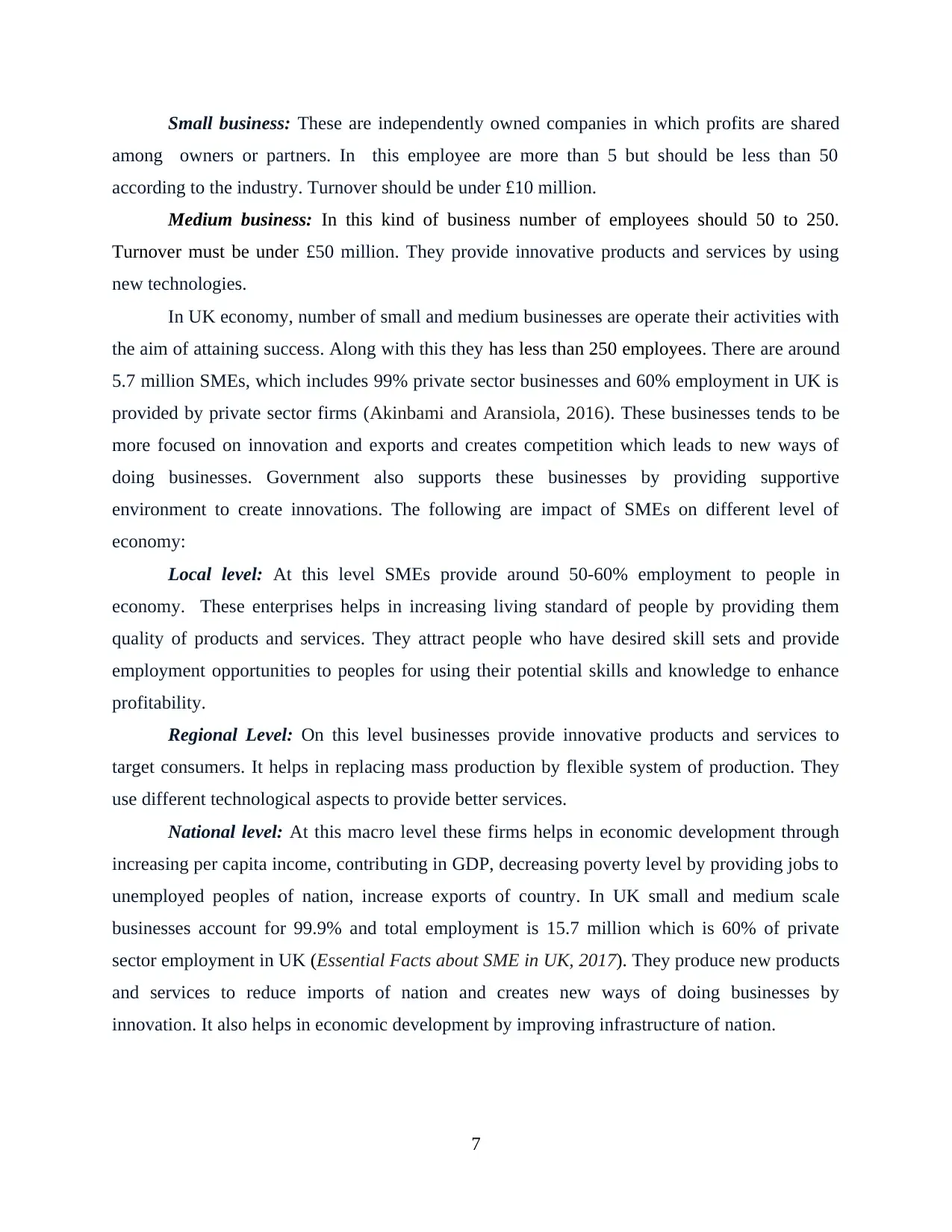
Small business: These are independently owned companies in which profits are shared
among owners or partners. In this employee are more than 5 but should be less than 50
according to the industry. Turnover should be under £10 million.
Medium business: In this kind of business number of employees should 50 to 250.
Turnover must be under £50 million. They provide innovative products and services by using
new technologies.
In UK economy, number of small and medium businesses are operate their activities with
the aim of attaining success. Along with this they has less than 250 employees. There are around
5.7 million SMEs, which includes 99% private sector businesses and 60% employment in UK is
provided by private sector firms (Akinbami and Aransiola, 2016). These businesses tends to be
more focused on innovation and exports and creates competition which leads to new ways of
doing businesses. Government also supports these businesses by providing supportive
environment to create innovations. The following are impact of SMEs on different level of
economy:
Local level: At this level SMEs provide around 50-60% employment to people in
economy. These enterprises helps in increasing living standard of people by providing them
quality of products and services. They attract people who have desired skill sets and provide
employment opportunities to peoples for using their potential skills and knowledge to enhance
profitability.
Regional Level: On this level businesses provide innovative products and services to
target consumers. It helps in replacing mass production by flexible system of production. They
use different technological aspects to provide better services.
National level: At this macro level these firms helps in economic development through
increasing per capita income, contributing in GDP, decreasing poverty level by providing jobs to
unemployed peoples of nation, increase exports of country. In UK small and medium scale
businesses account for 99.9% and total employment is 15.7 million which is 60% of private
sector employment in UK (Essential Facts about SME in UK, 2017). They produce new products
and services to reduce imports of nation and creates new ways of doing businesses by
innovation. It also helps in economic development by improving infrastructure of nation.
7
among owners or partners. In this employee are more than 5 but should be less than 50
according to the industry. Turnover should be under £10 million.
Medium business: In this kind of business number of employees should 50 to 250.
Turnover must be under £50 million. They provide innovative products and services by using
new technologies.
In UK economy, number of small and medium businesses are operate their activities with
the aim of attaining success. Along with this they has less than 250 employees. There are around
5.7 million SMEs, which includes 99% private sector businesses and 60% employment in UK is
provided by private sector firms (Akinbami and Aransiola, 2016). These businesses tends to be
more focused on innovation and exports and creates competition which leads to new ways of
doing businesses. Government also supports these businesses by providing supportive
environment to create innovations. The following are impact of SMEs on different level of
economy:
Local level: At this level SMEs provide around 50-60% employment to people in
economy. These enterprises helps in increasing living standard of people by providing them
quality of products and services. They attract people who have desired skill sets and provide
employment opportunities to peoples for using their potential skills and knowledge to enhance
profitability.
Regional Level: On this level businesses provide innovative products and services to
target consumers. It helps in replacing mass production by flexible system of production. They
use different technological aspects to provide better services.
National level: At this macro level these firms helps in economic development through
increasing per capita income, contributing in GDP, decreasing poverty level by providing jobs to
unemployed peoples of nation, increase exports of country. In UK small and medium scale
businesses account for 99.9% and total employment is 15.7 million which is 60% of private
sector employment in UK (Essential Facts about SME in UK, 2017). They produce new products
and services to reduce imports of nation and creates new ways of doing businesses by
innovation. It also helps in economic development by improving infrastructure of nation.
7
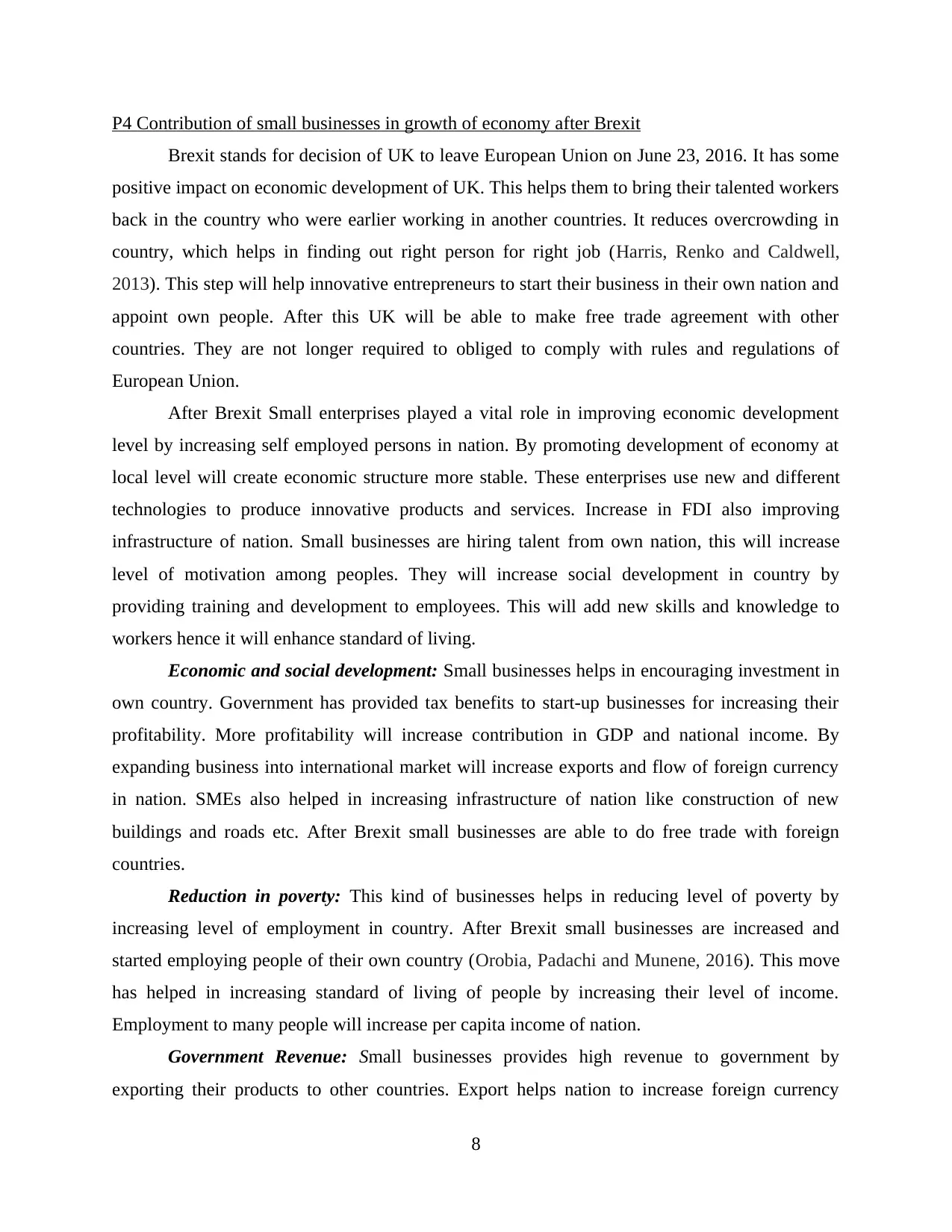
P4 Contribution of small businesses in growth of economy after Brexit
Brexit stands for decision of UK to leave European Union on June 23, 2016. It has some
positive impact on economic development of UK. This helps them to bring their talented workers
back in the country who were earlier working in another countries. It reduces overcrowding in
country, which helps in finding out right person for right job (Harris, Renko and Caldwell,
2013). This step will help innovative entrepreneurs to start their business in their own nation and
appoint own people. After this UK will be able to make free trade agreement with other
countries. They are not longer required to obliged to comply with rules and regulations of
European Union.
After Brexit Small enterprises played a vital role in improving economic development
level by increasing self employed persons in nation. By promoting development of economy at
local level will create economic structure more stable. These enterprises use new and different
technologies to produce innovative products and services. Increase in FDI also improving
infrastructure of nation. Small businesses are hiring talent from own nation, this will increase
level of motivation among peoples. They will increase social development in country by
providing training and development to employees. This will add new skills and knowledge to
workers hence it will enhance standard of living.
Economic and social development: Small businesses helps in encouraging investment in
own country. Government has provided tax benefits to start-up businesses for increasing their
profitability. More profitability will increase contribution in GDP and national income. By
expanding business into international market will increase exports and flow of foreign currency
in nation. SMEs also helped in increasing infrastructure of nation like construction of new
buildings and roads etc. After Brexit small businesses are able to do free trade with foreign
countries.
Reduction in poverty: This kind of businesses helps in reducing level of poverty by
increasing level of employment in country. After Brexit small businesses are increased and
started employing people of their own country (Orobia, Padachi and Munene, 2016). This move
has helped in increasing standard of living of people by increasing their level of income.
Employment to many people will increase per capita income of nation.
Government Revenue: Small businesses provides high revenue to government by
exporting their products to other countries. Export helps nation to increase foreign currency
8
Brexit stands for decision of UK to leave European Union on June 23, 2016. It has some
positive impact on economic development of UK. This helps them to bring their talented workers
back in the country who were earlier working in another countries. It reduces overcrowding in
country, which helps in finding out right person for right job (Harris, Renko and Caldwell,
2013). This step will help innovative entrepreneurs to start their business in their own nation and
appoint own people. After this UK will be able to make free trade agreement with other
countries. They are not longer required to obliged to comply with rules and regulations of
European Union.
After Brexit Small enterprises played a vital role in improving economic development
level by increasing self employed persons in nation. By promoting development of economy at
local level will create economic structure more stable. These enterprises use new and different
technologies to produce innovative products and services. Increase in FDI also improving
infrastructure of nation. Small businesses are hiring talent from own nation, this will increase
level of motivation among peoples. They will increase social development in country by
providing training and development to employees. This will add new skills and knowledge to
workers hence it will enhance standard of living.
Economic and social development: Small businesses helps in encouraging investment in
own country. Government has provided tax benefits to start-up businesses for increasing their
profitability. More profitability will increase contribution in GDP and national income. By
expanding business into international market will increase exports and flow of foreign currency
in nation. SMEs also helped in increasing infrastructure of nation like construction of new
buildings and roads etc. After Brexit small businesses are able to do free trade with foreign
countries.
Reduction in poverty: This kind of businesses helps in reducing level of poverty by
increasing level of employment in country. After Brexit small businesses are increased and
started employing people of their own country (Orobia, Padachi and Munene, 2016). This move
has helped in increasing standard of living of people by increasing their level of income.
Employment to many people will increase per capita income of nation.
Government Revenue: Small businesses provides high revenue to government by
exporting their products to other countries. Export helps nation to increase foreign currency
8
Secure Best Marks with AI Grader
Need help grading? Try our AI Grader for instant feedback on your assignments.
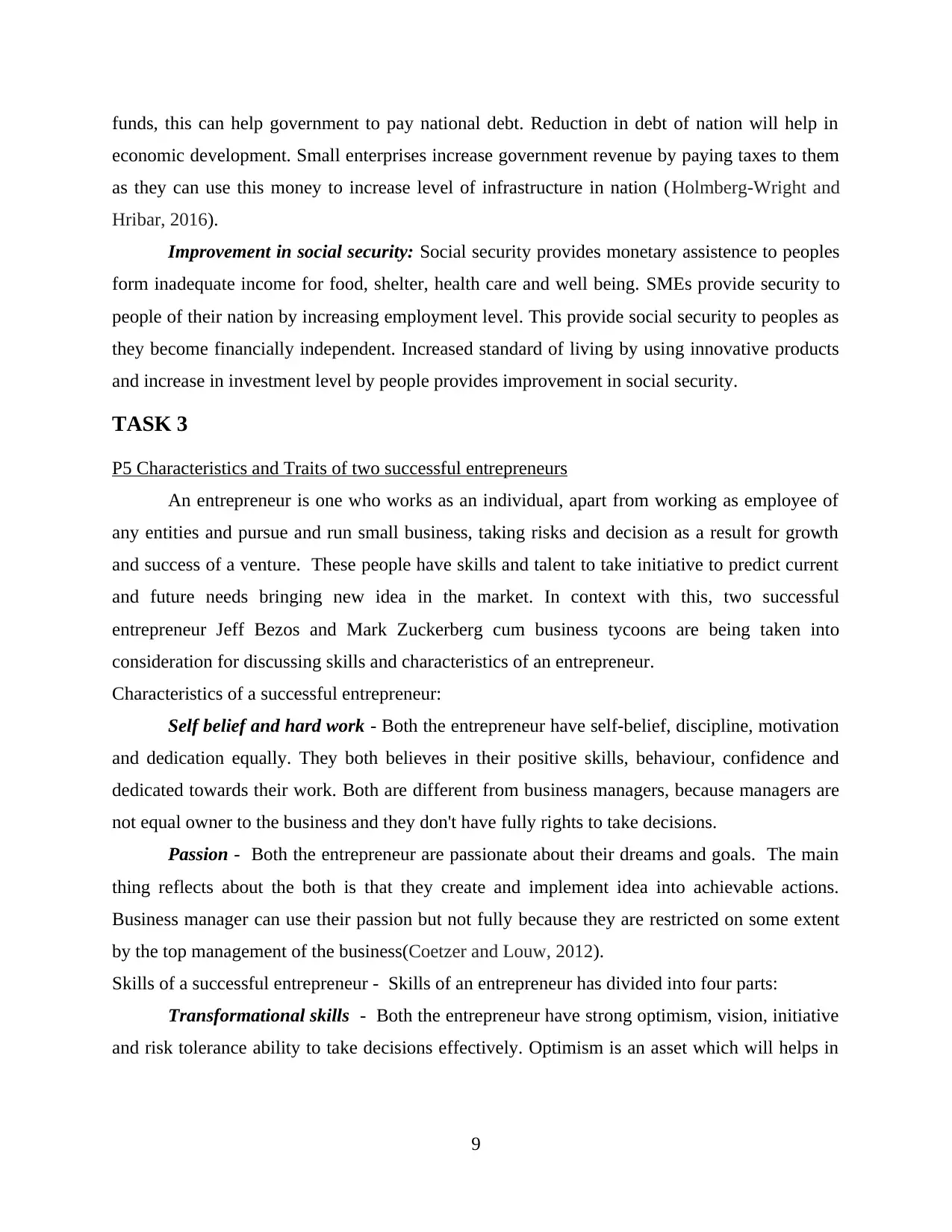
funds, this can help government to pay national debt. Reduction in debt of nation will help in
economic development. Small enterprises increase government revenue by paying taxes to them
as they can use this money to increase level of infrastructure in nation (Holmberg-Wright and
Hribar, 2016).
Improvement in social security: Social security provides monetary assistence to peoples
form inadequate income for food, shelter, health care and well being. SMEs provide security to
people of their nation by increasing employment level. This provide social security to peoples as
they become financially independent. Increased standard of living by using innovative products
and increase in investment level by people provides improvement in social security.
TASK 3
P5 Characteristics and Traits of two successful entrepreneurs
An entrepreneur is one who works as an individual, apart from working as employee of
any entities and pursue and run small business, taking risks and decision as a result for growth
and success of a venture. These people have skills and talent to take initiative to predict current
and future needs bringing new idea in the market. In context with this, two successful
entrepreneur Jeff Bezos and Mark Zuckerberg cum business tycoons are being taken into
consideration for discussing skills and characteristics of an entrepreneur.
Characteristics of a successful entrepreneur:
Self belief and hard work - Both the entrepreneur have self-belief, discipline, motivation
and dedication equally. They both believes in their positive skills, behaviour, confidence and
dedicated towards their work. Both are different from business managers, because managers are
not equal owner to the business and they don't have fully rights to take decisions.
Passion - Both the entrepreneur are passionate about their dreams and goals. The main
thing reflects about the both is that they create and implement idea into achievable actions.
Business manager can use their passion but not fully because they are restricted on some extent
by the top management of the business(Coetzer and Louw, 2012).
Skills of a successful entrepreneur - Skills of an entrepreneur has divided into four parts:
Transformational skills - Both the entrepreneur have strong optimism, vision, initiative
and risk tolerance ability to take decisions effectively. Optimism is an asset which will helps in
9
economic development. Small enterprises increase government revenue by paying taxes to them
as they can use this money to increase level of infrastructure in nation (Holmberg-Wright and
Hribar, 2016).
Improvement in social security: Social security provides monetary assistence to peoples
form inadequate income for food, shelter, health care and well being. SMEs provide security to
people of their nation by increasing employment level. This provide social security to peoples as
they become financially independent. Increased standard of living by using innovative products
and increase in investment level by people provides improvement in social security.
TASK 3
P5 Characteristics and Traits of two successful entrepreneurs
An entrepreneur is one who works as an individual, apart from working as employee of
any entities and pursue and run small business, taking risks and decision as a result for growth
and success of a venture. These people have skills and talent to take initiative to predict current
and future needs bringing new idea in the market. In context with this, two successful
entrepreneur Jeff Bezos and Mark Zuckerberg cum business tycoons are being taken into
consideration for discussing skills and characteristics of an entrepreneur.
Characteristics of a successful entrepreneur:
Self belief and hard work - Both the entrepreneur have self-belief, discipline, motivation
and dedication equally. They both believes in their positive skills, behaviour, confidence and
dedicated towards their work. Both are different from business managers, because managers are
not equal owner to the business and they don't have fully rights to take decisions.
Passion - Both the entrepreneur are passionate about their dreams and goals. The main
thing reflects about the both is that they create and implement idea into achievable actions.
Business manager can use their passion but not fully because they are restricted on some extent
by the top management of the business(Coetzer and Louw, 2012).
Skills of a successful entrepreneur - Skills of an entrepreneur has divided into four parts:
Transformational skills - Both the entrepreneur have strong optimism, vision, initiative
and risk tolerance ability to take decisions effectively. Optimism is an asset which will helps in
9
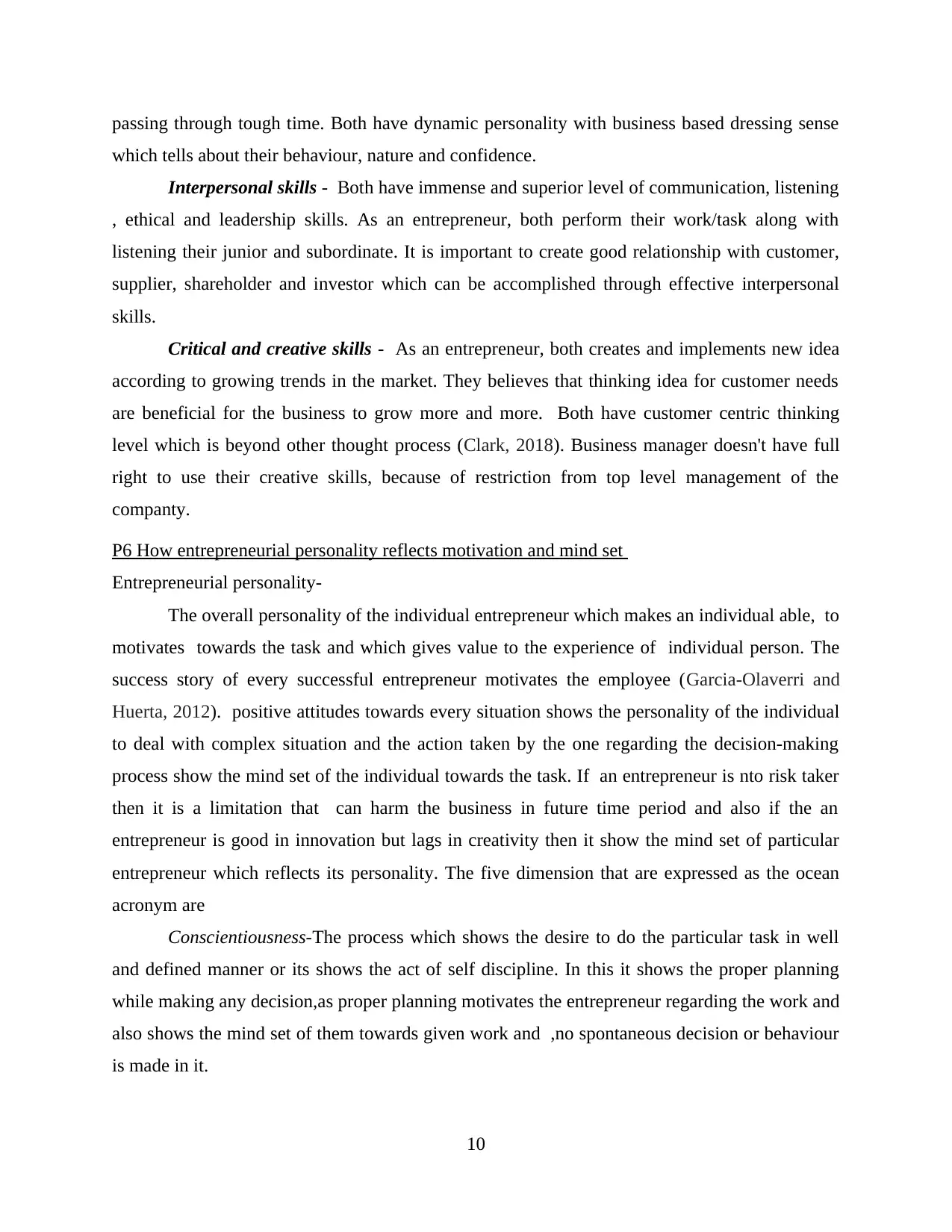
passing through tough time. Both have dynamic personality with business based dressing sense
which tells about their behaviour, nature and confidence.
Interpersonal skills - Both have immense and superior level of communication, listening
, ethical and leadership skills. As an entrepreneur, both perform their work/task along with
listening their junior and subordinate. It is important to create good relationship with customer,
supplier, shareholder and investor which can be accomplished through effective interpersonal
skills.
Critical and creative skills - As an entrepreneur, both creates and implements new idea
according to growing trends in the market. They believes that thinking idea for customer needs
are beneficial for the business to grow more and more. Both have customer centric thinking
level which is beyond other thought process (Clark, 2018). Business manager doesn't have full
right to use their creative skills, because of restriction from top level management of the
companty.
P6 How entrepreneurial personality reflects motivation and mind set
Entrepreneurial personality-
The overall personality of the individual entrepreneur which makes an individual able, to
motivates towards the task and which gives value to the experience of individual person. The
success story of every successful entrepreneur motivates the employee (Garcia-Olaverri and
Huerta, 2012). positive attitudes towards every situation shows the personality of the individual
to deal with complex situation and the action taken by the one regarding the decision-making
process show the mind set of the individual towards the task. If an entrepreneur is nto risk taker
then it is a limitation that can harm the business in future time period and also if the an
entrepreneur is good in innovation but lags in creativity then it show the mind set of particular
entrepreneur which reflects its personality. The five dimension that are expressed as the ocean
acronym are
Conscientiousness-The process which shows the desire to do the particular task in well
and defined manner or its shows the act of self discipline. In this it shows the proper planning
while making any decision,as proper planning motivates the entrepreneur regarding the work and
also shows the mind set of them towards given work and ,no spontaneous decision or behaviour
is made in it.
10
which tells about their behaviour, nature and confidence.
Interpersonal skills - Both have immense and superior level of communication, listening
, ethical and leadership skills. As an entrepreneur, both perform their work/task along with
listening their junior and subordinate. It is important to create good relationship with customer,
supplier, shareholder and investor which can be accomplished through effective interpersonal
skills.
Critical and creative skills - As an entrepreneur, both creates and implements new idea
according to growing trends in the market. They believes that thinking idea for customer needs
are beneficial for the business to grow more and more. Both have customer centric thinking
level which is beyond other thought process (Clark, 2018). Business manager doesn't have full
right to use their creative skills, because of restriction from top level management of the
companty.
P6 How entrepreneurial personality reflects motivation and mind set
Entrepreneurial personality-
The overall personality of the individual entrepreneur which makes an individual able, to
motivates towards the task and which gives value to the experience of individual person. The
success story of every successful entrepreneur motivates the employee (Garcia-Olaverri and
Huerta, 2012). positive attitudes towards every situation shows the personality of the individual
to deal with complex situation and the action taken by the one regarding the decision-making
process show the mind set of the individual towards the task. If an entrepreneur is nto risk taker
then it is a limitation that can harm the business in future time period and also if the an
entrepreneur is good in innovation but lags in creativity then it show the mind set of particular
entrepreneur which reflects its personality. The five dimension that are expressed as the ocean
acronym are
Conscientiousness-The process which shows the desire to do the particular task in well
and defined manner or its shows the act of self discipline. In this it shows the proper planning
while making any decision,as proper planning motivates the entrepreneur regarding the work and
also shows the mind set of them towards given work and ,no spontaneous decision or behaviour
is made in it.
10
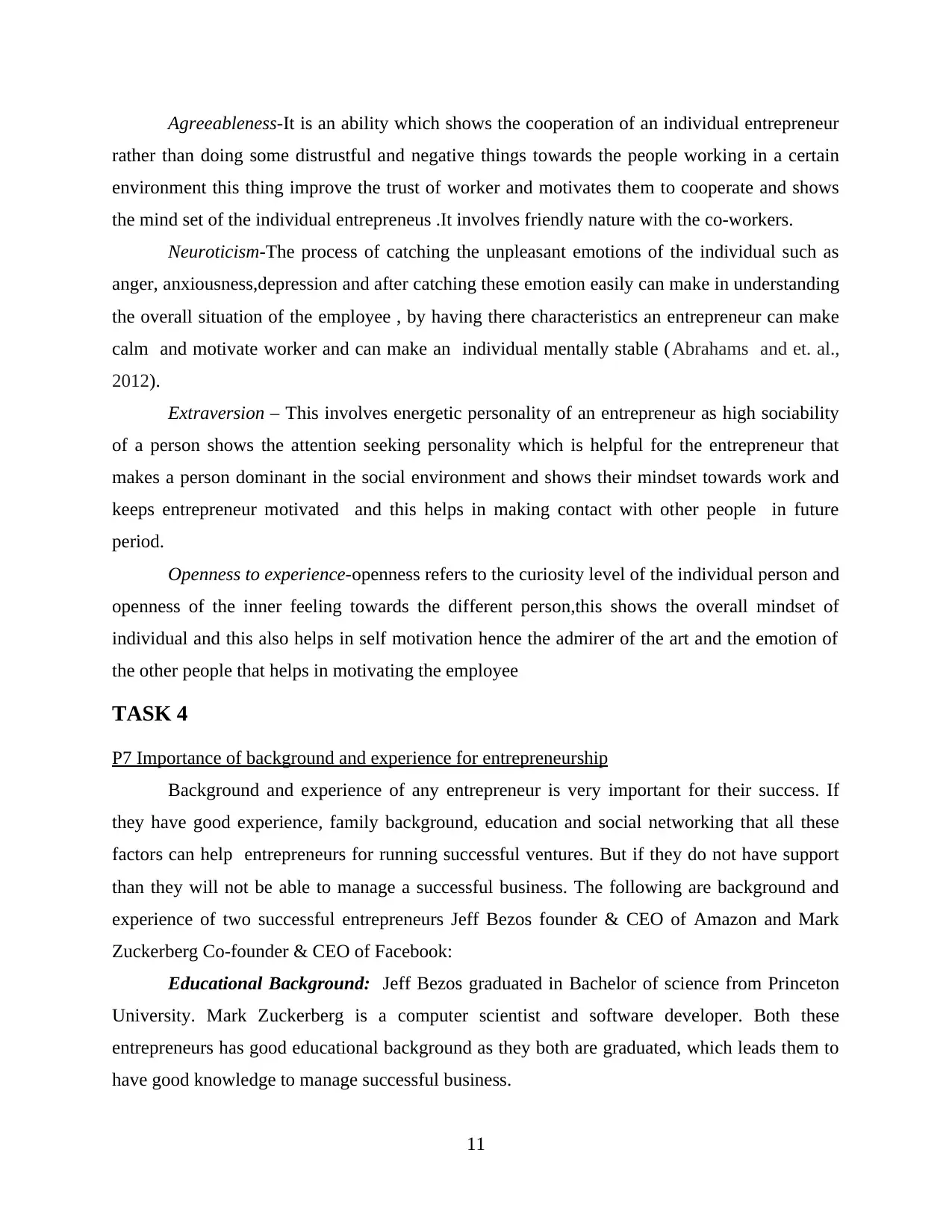
Agreeableness-It is an ability which shows the cooperation of an individual entrepreneur
rather than doing some distrustful and negative things towards the people working in a certain
environment this thing improve the trust of worker and motivates them to cooperate and shows
the mind set of the individual entrepreneus .It involves friendly nature with the co-workers.
Neuroticism-The process of catching the unpleasant emotions of the individual such as
anger, anxiousness,depression and after catching these emotion easily can make in understanding
the overall situation of the employee , by having there characteristics an entrepreneur can make
calm and motivate worker and can make an individual mentally stable (Abrahams and et. al.,
2012).
Extraversion – This involves energetic personality of an entrepreneur as high sociability
of a person shows the attention seeking personality which is helpful for the entrepreneur that
makes a person dominant in the social environment and shows their mindset towards work and
keeps entrepreneur motivated and this helps in making contact with other people in future
period.
Openness to experience-openness refers to the curiosity level of the individual person and
openness of the inner feeling towards the different person,this shows the overall mindset of
individual and this also helps in self motivation hence the admirer of the art and the emotion of
the other people that helps in motivating the employee
TASK 4
P7 Importance of background and experience for entrepreneurship
Background and experience of any entrepreneur is very important for their success. If
they have good experience, family background, education and social networking that all these
factors can help entrepreneurs for running successful ventures. But if they do not have support
than they will not be able to manage a successful business. The following are background and
experience of two successful entrepreneurs Jeff Bezos founder & CEO of Amazon and Mark
Zuckerberg Co-founder & CEO of Facebook:
Educational Background: Jeff Bezos graduated in Bachelor of science from Princeton
University. Mark Zuckerberg is a computer scientist and software developer. Both these
entrepreneurs has good educational background as they both are graduated, which leads them to
have good knowledge to manage successful business.
11
rather than doing some distrustful and negative things towards the people working in a certain
environment this thing improve the trust of worker and motivates them to cooperate and shows
the mind set of the individual entrepreneus .It involves friendly nature with the co-workers.
Neuroticism-The process of catching the unpleasant emotions of the individual such as
anger, anxiousness,depression and after catching these emotion easily can make in understanding
the overall situation of the employee , by having there characteristics an entrepreneur can make
calm and motivate worker and can make an individual mentally stable (Abrahams and et. al.,
2012).
Extraversion – This involves energetic personality of an entrepreneur as high sociability
of a person shows the attention seeking personality which is helpful for the entrepreneur that
makes a person dominant in the social environment and shows their mindset towards work and
keeps entrepreneur motivated and this helps in making contact with other people in future
period.
Openness to experience-openness refers to the curiosity level of the individual person and
openness of the inner feeling towards the different person,this shows the overall mindset of
individual and this also helps in self motivation hence the admirer of the art and the emotion of
the other people that helps in motivating the employee
TASK 4
P7 Importance of background and experience for entrepreneurship
Background and experience of any entrepreneur is very important for their success. If
they have good experience, family background, education and social networking that all these
factors can help entrepreneurs for running successful ventures. But if they do not have support
than they will not be able to manage a successful business. The following are background and
experience of two successful entrepreneurs Jeff Bezos founder & CEO of Amazon and Mark
Zuckerberg Co-founder & CEO of Facebook:
Educational Background: Jeff Bezos graduated in Bachelor of science from Princeton
University. Mark Zuckerberg is a computer scientist and software developer. Both these
entrepreneurs has good educational background as they both are graduated, which leads them to
have good knowledge to manage successful business.
11
Paraphrase This Document
Need a fresh take? Get an instant paraphrase of this document with our AI Paraphraser
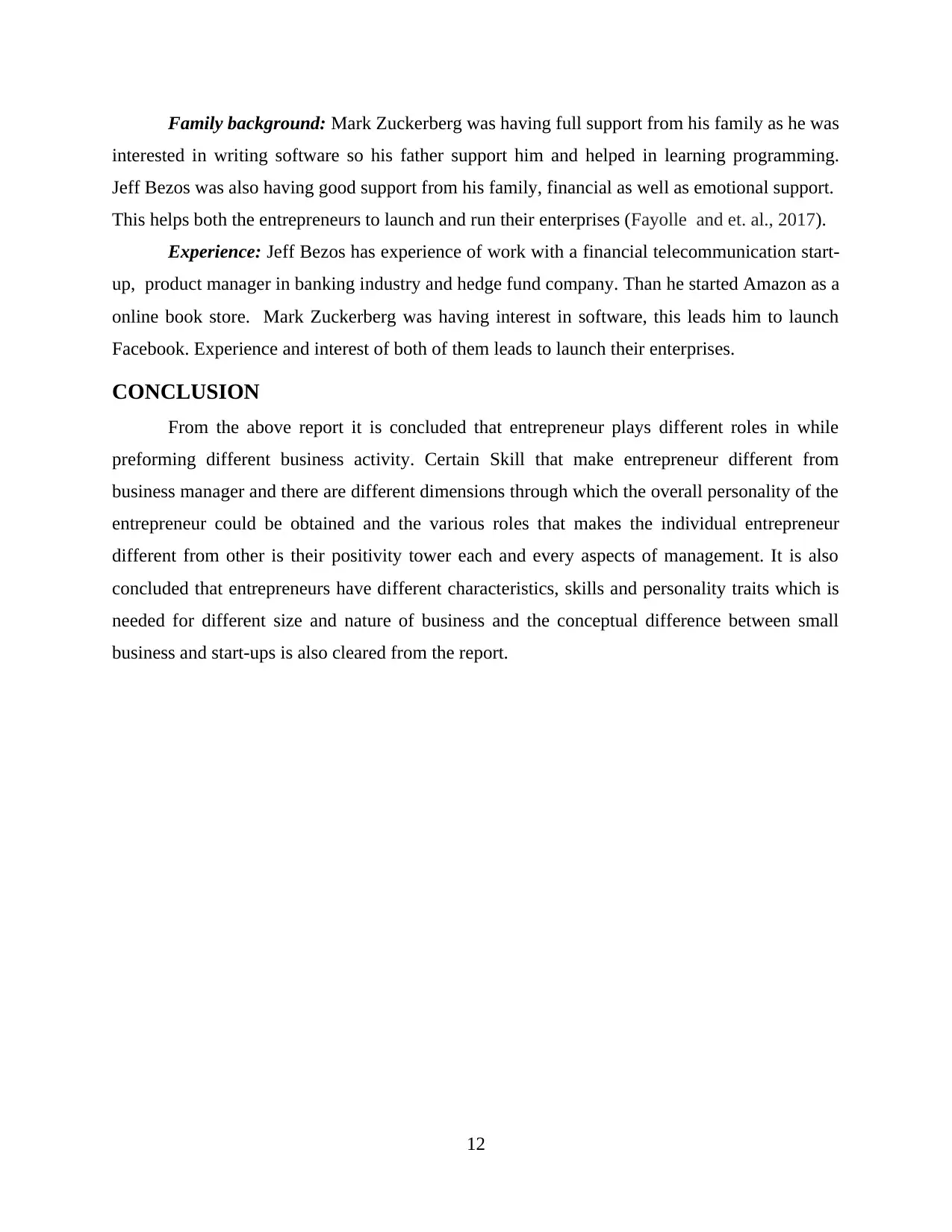
Family background: Mark Zuckerberg was having full support from his family as he was
interested in writing software so his father support him and helped in learning programming.
Jeff Bezos was also having good support from his family, financial as well as emotional support.
This helps both the entrepreneurs to launch and run their enterprises (Fayolle and et. al., 2017).
Experience: Jeff Bezos has experience of work with a financial telecommunication start-
up, product manager in banking industry and hedge fund company. Than he started Amazon as a
online book store. Mark Zuckerberg was having interest in software, this leads him to launch
Facebook. Experience and interest of both of them leads to launch their enterprises.
CONCLUSION
From the above report it is concluded that entrepreneur plays different roles in while
preforming different business activity. Certain Skill that make entrepreneur different from
business manager and there are different dimensions through which the overall personality of the
entrepreneur could be obtained and the various roles that makes the individual entrepreneur
different from other is their positivity tower each and every aspects of management. It is also
concluded that entrepreneurs have different characteristics, skills and personality traits which is
needed for different size and nature of business and the conceptual difference between small
business and start-ups is also cleared from the report.
12
interested in writing software so his father support him and helped in learning programming.
Jeff Bezos was also having good support from his family, financial as well as emotional support.
This helps both the entrepreneurs to launch and run their enterprises (Fayolle and et. al., 2017).
Experience: Jeff Bezos has experience of work with a financial telecommunication start-
up, product manager in banking industry and hedge fund company. Than he started Amazon as a
online book store. Mark Zuckerberg was having interest in software, this leads him to launch
Facebook. Experience and interest of both of them leads to launch their enterprises.
CONCLUSION
From the above report it is concluded that entrepreneur plays different roles in while
preforming different business activity. Certain Skill that make entrepreneur different from
business manager and there are different dimensions through which the overall personality of the
entrepreneur could be obtained and the various roles that makes the individual entrepreneur
different from other is their positivity tower each and every aspects of management. It is also
concluded that entrepreneurs have different characteristics, skills and personality traits which is
needed for different size and nature of business and the conceptual difference between small
business and start-ups is also cleared from the report.
12
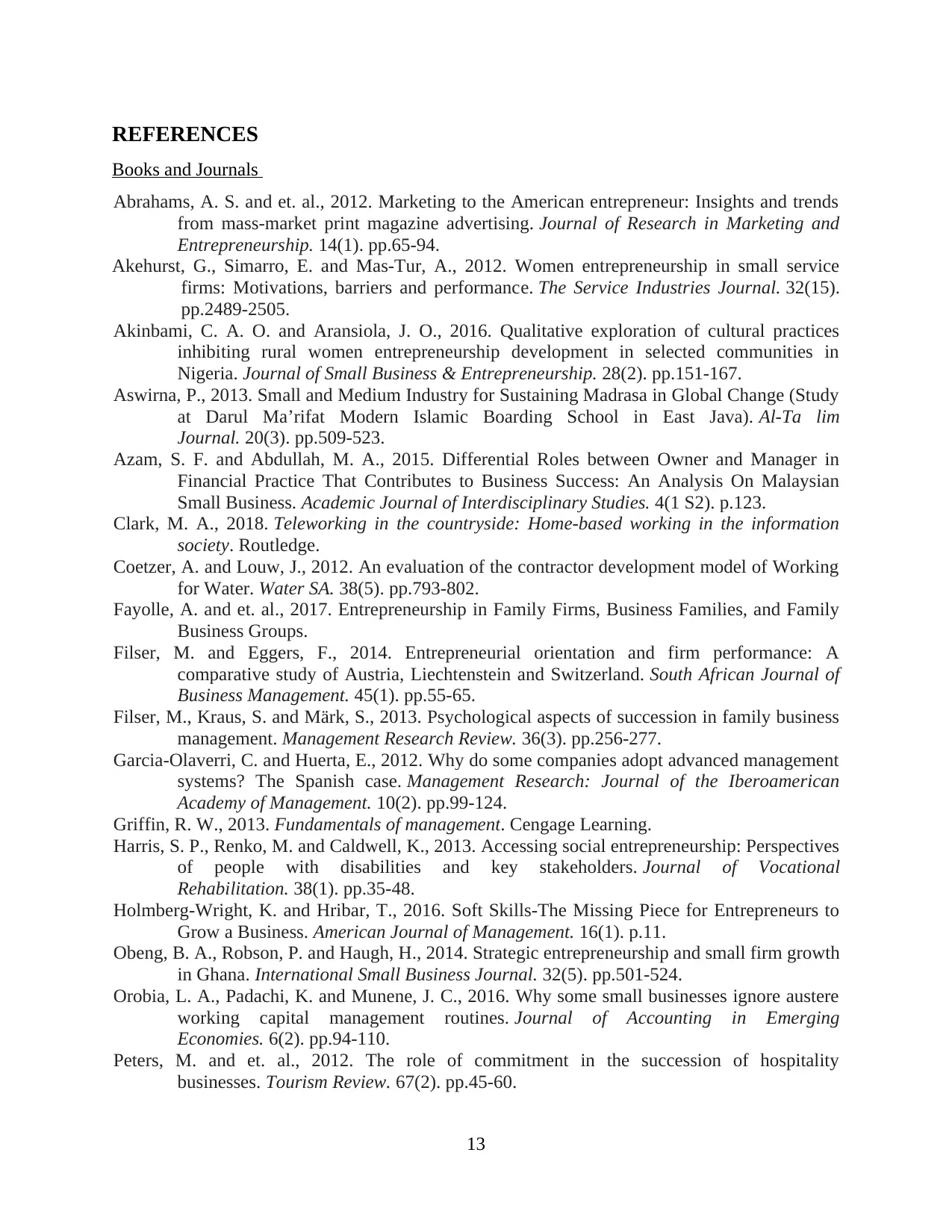
REFERENCES
Books and Journals
Abrahams, A. S. and et. al., 2012. Marketing to the American entrepreneur: Insights and trends
from mass-market print magazine advertising. Journal of Research in Marketing and
Entrepreneurship. 14(1). pp.65-94.
Akehurst, G., Simarro, E. and Mas‐Tur, A., 2012. Women entrepreneurship in small service
firms: Motivations, barriers and performance. The Service Industries Journal. 32(15).
pp.2489-2505.
Akinbami, C. A. O. and Aransiola, J. O., 2016. Qualitative exploration of cultural practices
inhibiting rural women entrepreneurship development in selected communities in
Nigeria. Journal of Small Business & Entrepreneurship. 28(2). pp.151-167.
Aswirna, P., 2013. Small and Medium Industry for Sustaining Madrasa in Global Change (Study
at Darul Ma’rifat Modern Islamic Boarding School in East Java). Al-Ta lim
Journal. 20(3). pp.509-523.
Azam, S. F. and Abdullah, M. A., 2015. Differential Roles between Owner and Manager in
Financial Practice That Contributes to Business Success: An Analysis On Malaysian
Small Business. Academic Journal of Interdisciplinary Studies. 4(1 S2). p.123.
Clark, M. A., 2018. Teleworking in the countryside: Home-based working in the information
society. Routledge.
Coetzer, A. and Louw, J., 2012. An evaluation of the contractor development model of Working
for Water. Water SA. 38(5). pp.793-802.
Fayolle, A. and et. al., 2017. Entrepreneurship in Family Firms, Business Families, and Family
Business Groups.
Filser, M. and Eggers, F., 2014. Entrepreneurial orientation and firm performance: A
comparative study of Austria, Liechtenstein and Switzerland. South African Journal of
Business Management. 45(1). pp.55-65.
Filser, M., Kraus, S. and Märk, S., 2013. Psychological aspects of succession in family business
management. Management Research Review. 36(3). pp.256-277.
Garcia-Olaverri, C. and Huerta, E., 2012. Why do some companies adopt advanced management
systems? The Spanish case. Management Research: Journal of the Iberoamerican
Academy of Management. 10(2). pp.99-124.
Griffin, R. W., 2013. Fundamentals of management. Cengage Learning.
Harris, S. P., Renko, M. and Caldwell, K., 2013. Accessing social entrepreneurship: Perspectives
of people with disabilities and key stakeholders. Journal of Vocational
Rehabilitation. 38(1). pp.35-48.
Holmberg-Wright, K. and Hribar, T., 2016. Soft Skills-The Missing Piece for Entrepreneurs to
Grow a Business. American Journal of Management. 16(1). p.11.
Obeng, B. A., Robson, P. and Haugh, H., 2014. Strategic entrepreneurship and small firm growth
in Ghana. International Small Business Journal. 32(5). pp.501-524.
Orobia, L. A., Padachi, K. and Munene, J. C., 2016. Why some small businesses ignore austere
working capital management routines. Journal of Accounting in Emerging
Economies. 6(2). pp.94-110.
Peters, M. and et. al., 2012. The role of commitment in the succession of hospitality
businesses. Tourism Review. 67(2). pp.45-60.
13
Books and Journals
Abrahams, A. S. and et. al., 2012. Marketing to the American entrepreneur: Insights and trends
from mass-market print magazine advertising. Journal of Research in Marketing and
Entrepreneurship. 14(1). pp.65-94.
Akehurst, G., Simarro, E. and Mas‐Tur, A., 2012. Women entrepreneurship in small service
firms: Motivations, barriers and performance. The Service Industries Journal. 32(15).
pp.2489-2505.
Akinbami, C. A. O. and Aransiola, J. O., 2016. Qualitative exploration of cultural practices
inhibiting rural women entrepreneurship development in selected communities in
Nigeria. Journal of Small Business & Entrepreneurship. 28(2). pp.151-167.
Aswirna, P., 2013. Small and Medium Industry for Sustaining Madrasa in Global Change (Study
at Darul Ma’rifat Modern Islamic Boarding School in East Java). Al-Ta lim
Journal. 20(3). pp.509-523.
Azam, S. F. and Abdullah, M. A., 2015. Differential Roles between Owner and Manager in
Financial Practice That Contributes to Business Success: An Analysis On Malaysian
Small Business. Academic Journal of Interdisciplinary Studies. 4(1 S2). p.123.
Clark, M. A., 2018. Teleworking in the countryside: Home-based working in the information
society. Routledge.
Coetzer, A. and Louw, J., 2012. An evaluation of the contractor development model of Working
for Water. Water SA. 38(5). pp.793-802.
Fayolle, A. and et. al., 2017. Entrepreneurship in Family Firms, Business Families, and Family
Business Groups.
Filser, M. and Eggers, F., 2014. Entrepreneurial orientation and firm performance: A
comparative study of Austria, Liechtenstein and Switzerland. South African Journal of
Business Management. 45(1). pp.55-65.
Filser, M., Kraus, S. and Märk, S., 2013. Psychological aspects of succession in family business
management. Management Research Review. 36(3). pp.256-277.
Garcia-Olaverri, C. and Huerta, E., 2012. Why do some companies adopt advanced management
systems? The Spanish case. Management Research: Journal of the Iberoamerican
Academy of Management. 10(2). pp.99-124.
Griffin, R. W., 2013. Fundamentals of management. Cengage Learning.
Harris, S. P., Renko, M. and Caldwell, K., 2013. Accessing social entrepreneurship: Perspectives
of people with disabilities and key stakeholders. Journal of Vocational
Rehabilitation. 38(1). pp.35-48.
Holmberg-Wright, K. and Hribar, T., 2016. Soft Skills-The Missing Piece for Entrepreneurs to
Grow a Business. American Journal of Management. 16(1). p.11.
Obeng, B. A., Robson, P. and Haugh, H., 2014. Strategic entrepreneurship and small firm growth
in Ghana. International Small Business Journal. 32(5). pp.501-524.
Orobia, L. A., Padachi, K. and Munene, J. C., 2016. Why some small businesses ignore austere
working capital management routines. Journal of Accounting in Emerging
Economies. 6(2). pp.94-110.
Peters, M. and et. al., 2012. The role of commitment in the succession of hospitality
businesses. Tourism Review. 67(2). pp.45-60.
13
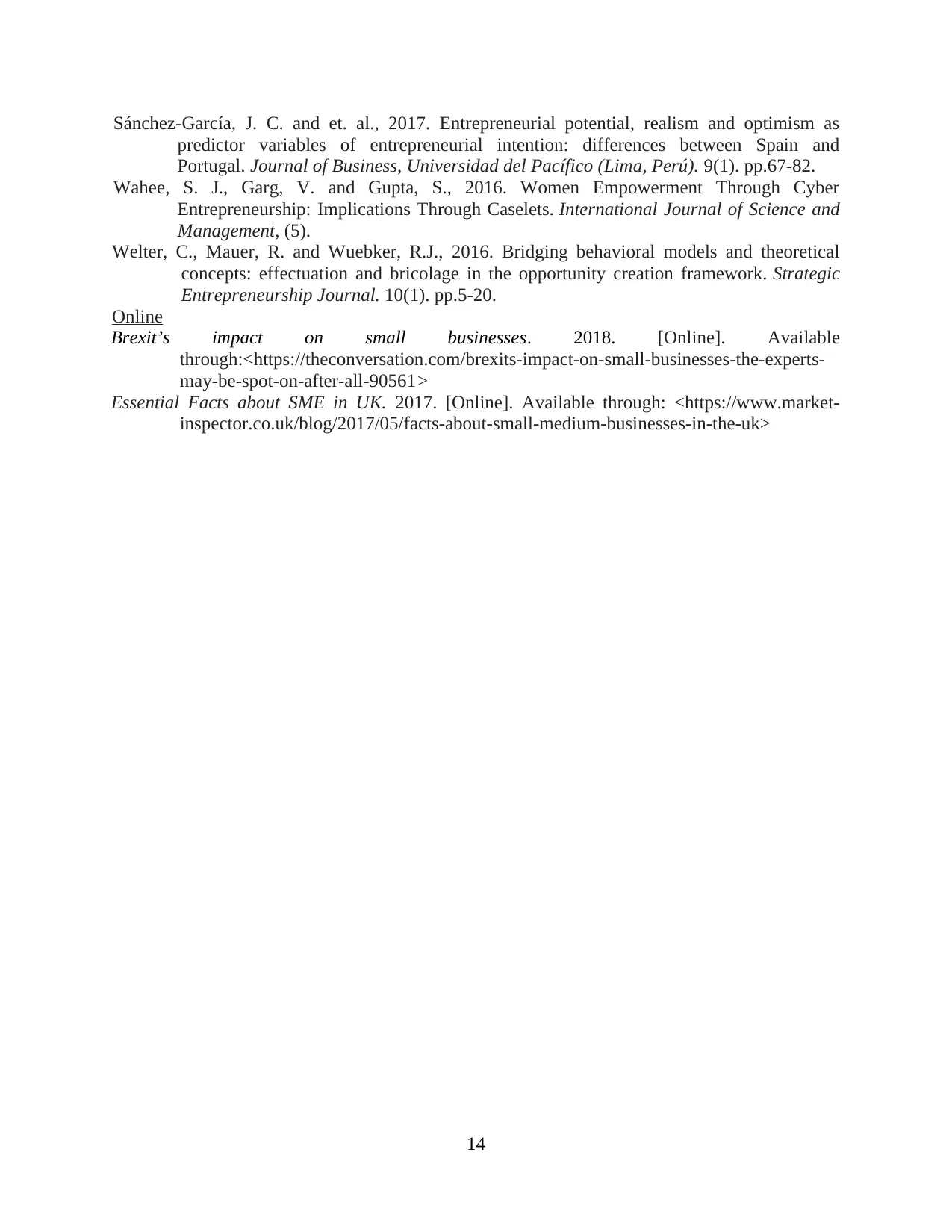
Sánchez-García, J. C. and et. al., 2017. Entrepreneurial potential, realism and optimism as
predictor variables of entrepreneurial intention: differences between Spain and
Portugal. Journal of Business, Universidad del Pacífico (Lima, Perú). 9(1). pp.67-82.
Wahee, S. J., Garg, V. and Gupta, S., 2016. Women Empowerment Through Cyber
Entrepreneurship: Implications Through Caselets. International Journal of Science and
Management, (5).
Welter, C., Mauer, R. and Wuebker, R.J., 2016. Bridging behavioral models and theoretical
concepts: effectuation and bricolage in the opportunity creation framework. Strategic
Entrepreneurship Journal. 10(1). pp.5-20.
Online
Brexit’s impact on small businesses. 2018. [Online]. Available
through:<https://theconversation.com/brexits-impact-on-small-businesses-the-experts-
may-be-spot-on-after-all-90561>
Essential Facts about SME in UK. 2017. [Online]. Available through: <https://www.market-
inspector.co.uk/blog/2017/05/facts-about-small-medium-businesses-in-the-uk>
14
predictor variables of entrepreneurial intention: differences between Spain and
Portugal. Journal of Business, Universidad del Pacífico (Lima, Perú). 9(1). pp.67-82.
Wahee, S. J., Garg, V. and Gupta, S., 2016. Women Empowerment Through Cyber
Entrepreneurship: Implications Through Caselets. International Journal of Science and
Management, (5).
Welter, C., Mauer, R. and Wuebker, R.J., 2016. Bridging behavioral models and theoretical
concepts: effectuation and bricolage in the opportunity creation framework. Strategic
Entrepreneurship Journal. 10(1). pp.5-20.
Online
Brexit’s impact on small businesses. 2018. [Online]. Available
through:<https://theconversation.com/brexits-impact-on-small-businesses-the-experts-
may-be-spot-on-after-all-90561>
Essential Facts about SME in UK. 2017. [Online]. Available through: <https://www.market-
inspector.co.uk/blog/2017/05/facts-about-small-medium-businesses-in-the-uk>
14
1 out of 16
Related Documents
Your All-in-One AI-Powered Toolkit for Academic Success.
+13062052269
info@desklib.com
Available 24*7 on WhatsApp / Email
![[object Object]](/_next/static/media/star-bottom.7253800d.svg)
Unlock your academic potential
© 2024 | Zucol Services PVT LTD | All rights reserved.





